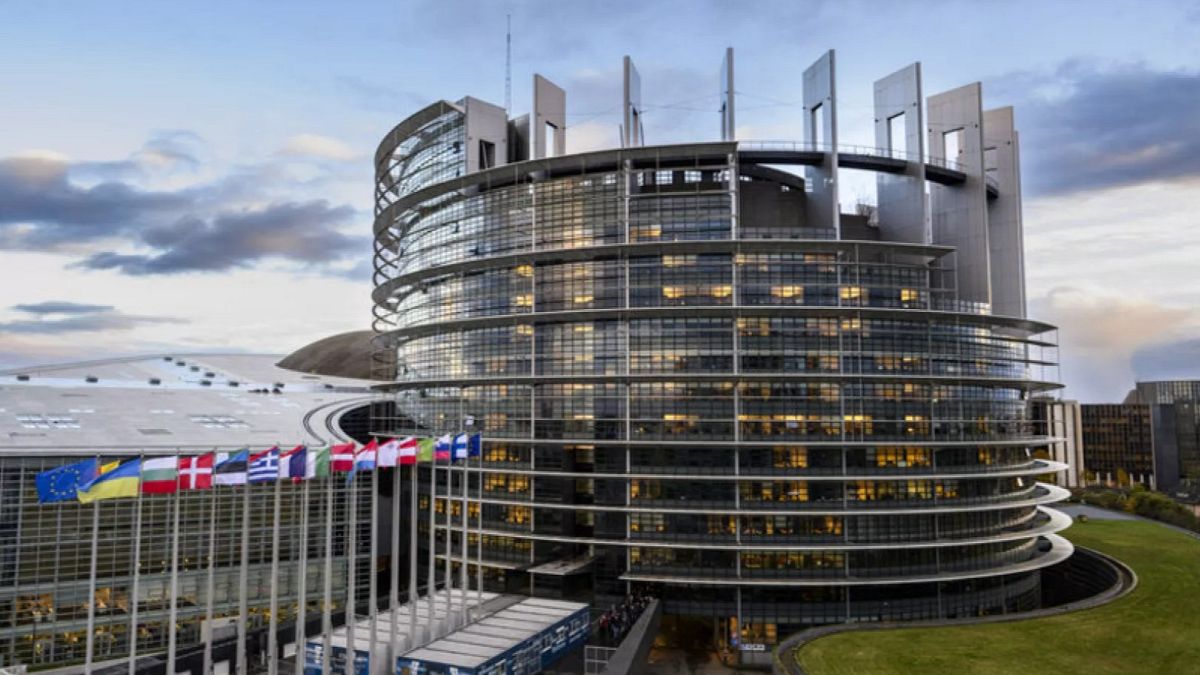Misuse of funds intended to pay MEPs’ assistants has been fairly widespread in the last years, but few episodes land in court cases.
French far-right politician Marine Le Pen and eight other former members of the European Parliament from her party were found guilty of embezzling EU funds.
But they were not alone and misuse of money earmarked to pay MEP’s assistants is quite common in the Parliament, multiple sources familiar with the Parliament’s internal working have told Euronews.
How MEPs should pay their assistants
Each MEP is entitled to a monthly sum earmarked for paying their assistants, which amounts to €30,769 in the current legislature (2024-2029), a slight rise from the previous one.
At least 40% of this allowance is for accredited assistants (APA), those working in the Parliament’s premises in Brussels, Luxembourg or Strasbourg and employed directly by the Parliament.
The remaining 60% may be used for “local assistants”, employed either directly by the MEP or via a service provider, and working from the MEP’s constituency in their member state. Expenses related to APAs’ and local assistants’ work are defrayed only “for assistance which is necessary and directly linked to the exercise of a Member’s parliamentary mandate.”
This rule has frequently been broken in the past, and is still being breached, according to the sources.
Since the boundaries between what constitutes work “necessary and directly linked” to the role of MEP, and what does not, are not crystal clear, “local assistants” often perform duties that are not strictly related to the MEP’s activity in the Parliament.
“Some MEPs employ local politicians doing political activity in their constituency,” said one source in the Parliament, speaking freely on the basis of anonymity. “Then their calls and meetings are twisted to be reported as related, in one way or another, to the MEP’s parliamentary mandate,” this source added.
Sometimes, this practice is revealed and has resulted in several episodes of embezzlement and misuse of funds in the last years.
Marine Le Pen’s case drew international attention, as did that of former UKIP leader Nigel Farage when he employed an assistant to work on matters unrelated to the Parliament, or that of the Parliament’s Greek socialist former Vice-President Eva Kaili, accused of having misspent between €120,000 and €150,000.
Beneath the surface of the celebrated cases, however, other MEPs have become similarly entangled.
The Parliament does not provide any statistics on the issue, but has been joined to civil proceedings brought against MEPs nine times in the last ten years, in cases related to fraud against the EU financial interest .
“Our objective when joining as a civil party is always to participate in safeguarding European taxpayers’ funds and the budget of the European Parliament,” the Parliament’s press service told Euronews.
But not all incidents of misuse of funds land in court, another source told Euronews on condition of anonymity.
In some cases the Parliament conducts an internal administrative check and asks the MEP to pay back the misspent sum, issuing a recovery notice. The Parliament may also refer matters to the competent European and national authorities where there is suspicion of fraud.
In others, it is the European Anti-Fraud Office (OLAF) which gets a tip-off, and after a pre-screening stage, decides to investigate (this was the case for Le Pen).
Tips-off can come from anyone, and are sometimes brought to OLAF by other MEPs. “Alert to Le Pen came from her political opponents,” the second source said.
However, only few tips-off generate an OLAF investigation and even fewer result in a final report: more often the anti-fraud Office does not find sufficient grounds to proceed.
By contrast when OLAF does investigate further, it hands its findings back to the Parliament, which can decide how to proceed.
In case of criminal offences, like fraud, OLAF refers the case to the European Public Prosecutor’s Office (EPPO), which can investigate ex officio, or involve a national prosecutor. EPPO has only been active since 2021, however, and cases pre-dating that – such as Le Pen’s – were sent to national judiciaries.
The EPPO doesn’t provide figures or confirm which cases it’s working on, to avoid endangering ongoing procedures and their outcome, according to its press office. But the European Public Prosecutor has made public several cases during the process of investigation however.
In 2023, for example, The EPPO seized more than €170,000 in assets belonging to Italian Stefania Zambelli, then an MEP with Italy’s The League.
“We don’t know how many MEPs are involved in this practice. The parliament does not make that information public, although we think they should,” Nicholas Aiossa, director at the NGO Transparency International EU, told Euronews.
“Sometimes the cases are discovered through investigative journalism. We have also, over the years, had whistleblowers approaching us to outline allowance misuse schemes as well,” he said.
To gauge how widespread malpractice may be, Aiossa cites a 2023 Follow The Money report which stated that 139 EU lawmakers misused money they receive for assistants and the Parliament has recovered funds on 155 occasions between 2019 and 2022.
In reference to this report, the European Parliament’s press service told Euronews: “Most are technical recoveries unrelated to wrongdoing. Only a minority of cases concerned assistants. The ‘amounts recovered’ include minor cases of potential abuse but mainly consist of technical adjustments, administrative errors, and voluntary reimbursements.”
Read the full article here


